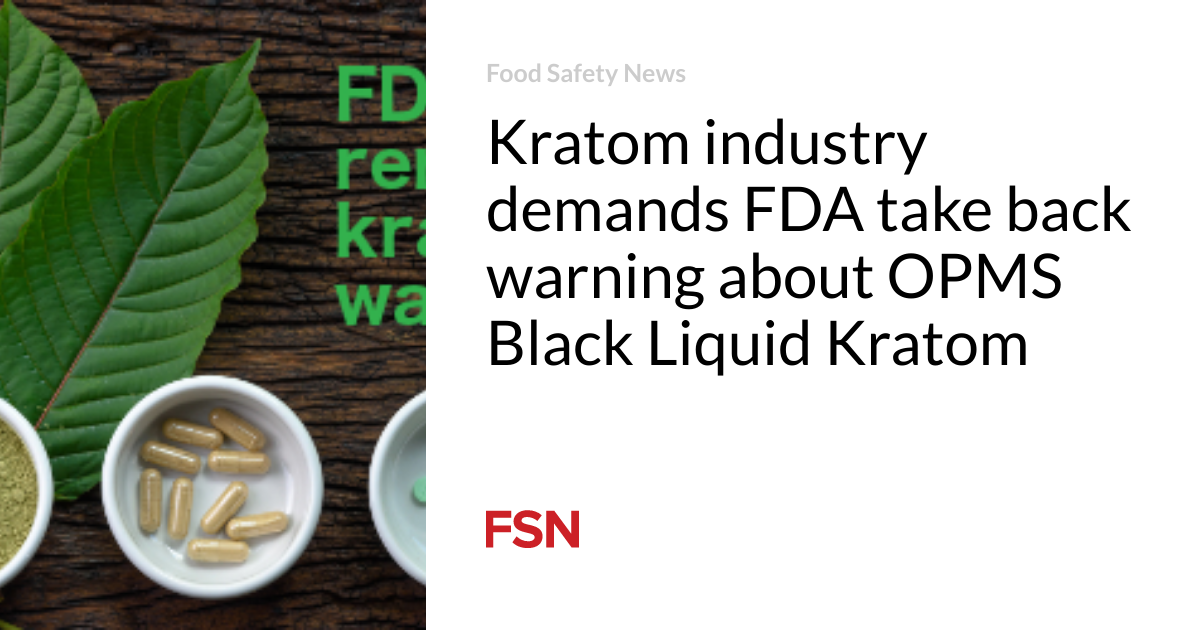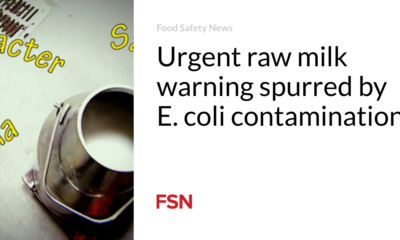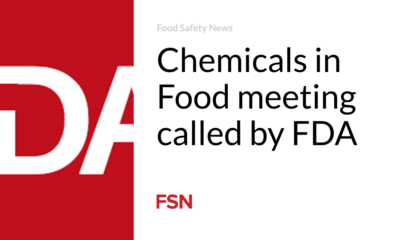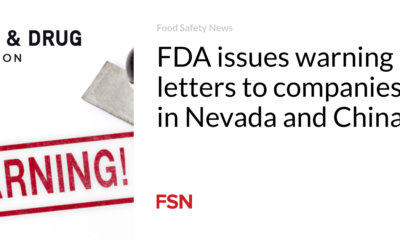Food
The Kratom Industry Demands that the FDA Take Back the Warning on OPMS Black Liquid Kratom

Late last month, the Food and Drug Administration again warned the public about a Kratom product, advising consumers not to consume OPMS Black Liquid Kratom, which is sold online and in some stores.
According to the FDA, OPMS Black Liquid Kratom has been linked to serious adverse health effects, including death.
But this month, the American Kratom Association (AKA) is asking FDA Commissioner Robert Califf to immediately remove the July 26 consumer warning regarding OPMS Black Liquid Kratom until the agency independently verifies the alleged claims regarding the death that have been conclusively has been proven to be attributed to OPMS Black Liquid Kratom. to this product.
Mac Haddow, Senior Fellow on Public Policy at AKA, demanded that Califf take action.
“The FDA’s safety warning about a kratom product appears to be another reiteration of previously debunked FDA claims that kratom killed nine people in Sweden in 2009, which the FDA cited in their report. Federal Register Notice in 2016 justifying the recommendation to classify kratom as a Schedule I substance. Haddow said.
“Investigators ultimately determined that the deaths were caused by mixing a toxic adulterant, O-desmethyl tramadol, into the kratom product. The HHS Assistant Secretary of Health wrote a scathing withdrawal letter to the FDA’s scheduling recommendation and publicly called out the FDA for using “embarrassingly poor evidence and data in kratom scheduling.”
Haddow further said that the FDA’s most recent safety alert vaguely refers to a reported death from kratom, but provides no details or credible evidence that would link the death to the kratom product referenced by the FDA.
The recent report of side effects of an individual who died after using OPMS Black Liquid Kratom was received by the FDA, one of many reports of serious side effects that individuals have reported after consuming OPMS Black Liquid Kratom.
Others reported adverse health effects, including withdrawal symptoms, addiction, digestive problems, restless leg syndrome, skin problems, aggressive behavior, increased anxiety, lack of energy and inability to concentrate. The product label for OPMS Black Liquid Kratom indicates the presence of kratom alkaloids, mitragynine and 7-hydroxy mitragynine (7-OH mitragynine).
Products containing kratom have been marketed as food, including dietary supplements or medications with claims of therapeutic benefits. However, the FDA has not approved any prescription or over-the-counter drugs containing kratom or related compounds, mitragynine, and the more potent metabolite, 7-OH mitragynine. Additionally, the FDA has serious safety concerns with the use of kratom in dietary supplements and conventional foods.
Based on the available scientific data and information, the FDA has concluded that kratom is not lawfully marketed as a dietary supplement and cannot lawfully be added to conventional foods.
The FDA has continued to warn consumers not to use kratom due to the risk of serious side effects, including liver toxicity, seizures, and substance use disorders (SUD).
But millions of Americans are using the opioid-like herbal supplement known as kratom, and there is evidence that its dangers are increasing.
The FDA called the warning about OPMS Black Liquid Kratom just another warning for a product it had previously announced. “The FDA recently received an adverse event report from an individual who died after using OPMS Black Liquid Kratom,” the agency statement said. “This is one of several reports of serious side effects that individuals have reported” after using the supplement, the FDA added.
“The consistently unreliable and often false statements about kratom made by the FDA over the past decade, part of its relentless and misguided push to ban kratom products not supported by reliable science, are wrong, and Commissioner Califf should his office must stop being fully responsible,” Haddow added. “The various autopsy reports claiming kratom as the sole cause of death have been thoroughly refuted as incomplete, poorly documented, hastily completed, or demonstrably false.”
Kratom is an herbal supplement derived from the dried leaves of a tropical evergreen tree in the coffee family. A chemical called mitragynine, found in kratom, modifies some of the same brain receptors that respond to opioids.
However, mitragynine overdoses are toxic to the liver and can be fatal.
Kratom has been used for centuries in its native Southeast Asia to produce increased energy and relaxation, according to the U.S. National Institute on Drug Abuse.
The drug is largely unregulated: anyone can buy kratom online and it can be found in convenience stores, gas stations, and vape shops. Some bars that serve botanical drinks offer kratom tea.
According to the National Survey on Drug Use, approximately 1.7 million people aged 12 and older used kratom in the United States in 2021.
The FDA said mitragynine and 7-hydroxy mitragynine (7-OH mitragynine) are listed as ingredients on the product’s label.
The American Kratom Association (AKA) is a non-governmental organization for people who consume natural kratom.
(Click here to sign up for a free subscription to Food Safety News.)











